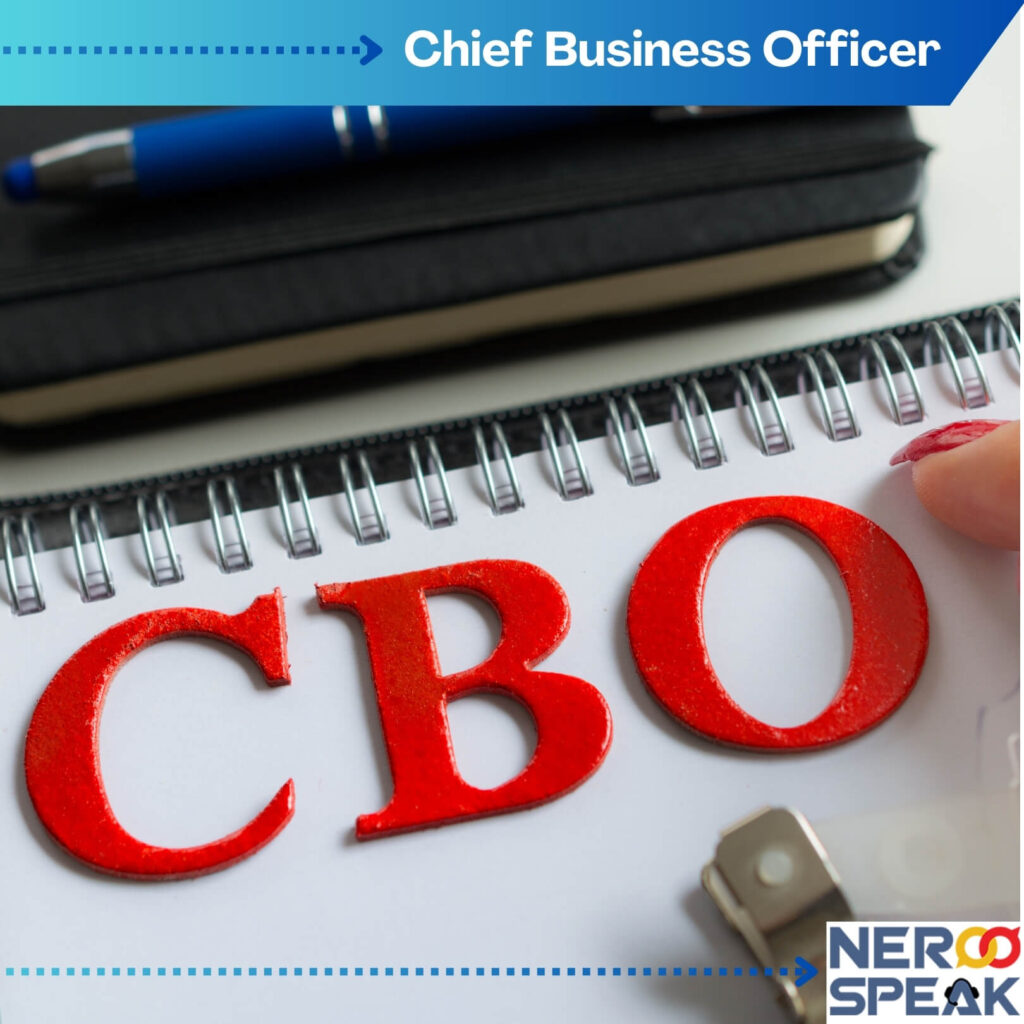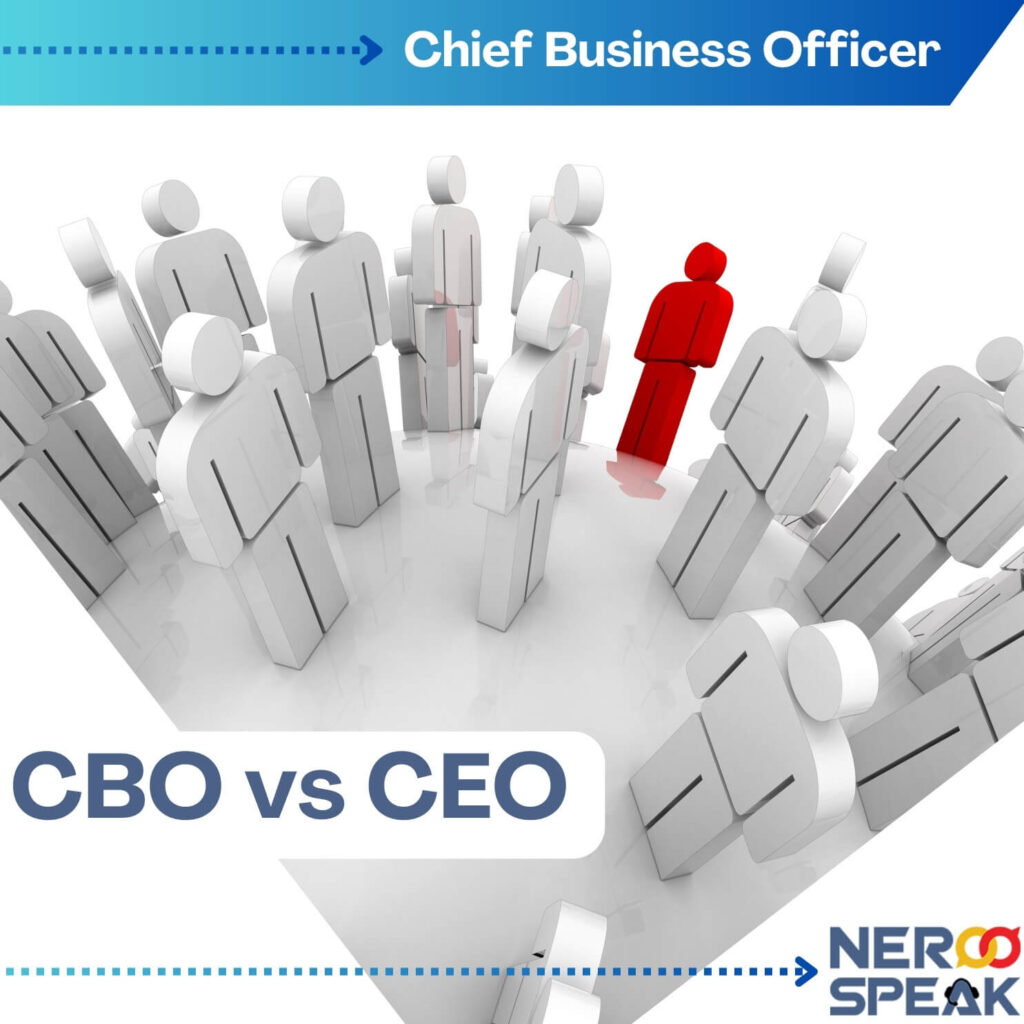The path to being a Chief Business Officer (CBO) includes formal education, a variety of work experiences, and the development of key skills.

Career Path to Becoming a CBO
Here’s a close look at the career path to this important role:
1- Educational Background
Undergraduate Degree:
Most Chief Business Officers start with a bachelor’s degree in business administration, marketing, economics, or a related area. This basic education gives important knowledge in business basics, money analysis, and market changes.
Advanced Degrees:
An MBA (Master of Business Administration) is very useful and often taken by people who want to become CBOs. The best MBA programs have special classes in business strategy, leadership, and management. These classes help students gain the advanced skills they need for top jobs. Some people may also choose other master’s degrees, like in finance or marketing, based on what they want to do in their careers.

2- Professional Experience
Early Career:
Early career jobs usually involve work in business development, sales, marketing, finance, or operations. These positions help you learn how different parts of a business work together to reach common goals.
Mid-Level Management:
Moving up to mid-level management jobs, like a business development manager, sales director, or marketing manager, is important. These jobs give real experience in handling teams, increasing revenue, and carrying out plans.
Senior Leadership Roles:
Aspiring CBOs often advance to senior leadership roles like Vice President (VP) of Business Development, Chief Operating Officer (COO), or Chief Marketing Officer (CMO). These jobs have a lot of responsibility for planning strategies, growing the business, and leading different departments.
Read also: All About Customer Business Emoticon
3- Key Skills and Competencies
Strategic Thinking:
CBOs need to have good strategic thinking skills. This helps them find chances for growth, create business plans, and make sure those plans match the company’s long-term goals.
Leadership and Management:
Good leadership and team management skills are very important. CBOs must inspire and guide their teams. They should create a team spirit and make sure that business units aim for the same goals.
Financial Acumen:
A clear understanding of money basics, like making budgets, planning finances, and looking at the numbers, is important. CBOs need to make decisions based on data that improve profit and help keep the business strong.
Communication and Negotiation:
Strong communication skills are very important for talking with stakeholders, making deals, and representing the company in outside activities. Good communication makes sure that business plans are clear and understood by everyone in the organization.
Read also: Powerful Words for Business Names
4- Professional Development
Certifications and Training:
Pursuing certifications like Certified Business Development Professional (CBDP) or joining executive training programs can improve a person’s credentials. It also helps them stay current with the newest industry practices.
Networking:
Building a strong professional network at industry conferences, seminars, and professional groups can offer good chances for mentorship, partnerships, and career growth.
The Road to CBO
The road to becoming a CBO is hard but also worthwhile. It needs a mix of learning, experience, and smart skill development. By doing well in different business tasks, improving skills often, and showing good leadership, workers can move up to this important job. They will help the business grow and guide its future.
Responsibilities of a Chief Business Officer
The Chief Business Officer (CBO) has many important roles that are key for the growth and smooth running of a company. The CBO is responsible for several areas, and each one matters for the company’s success. Here’s a closer look at the main duties of a CBO:

1- Strategic Planning and Business Development
Strategic Vision:
The main job of the CBO is to create and carry out the company’s strategic vision. This means finding market chances, looking at industry trends, and setting long-term goals. The CBO makes sure that the company’s strategy matches its mission and goals, leading to ongoing growth.
Business Growth:
The CBO helps the company grow its market presence and revenue. This means looking into new markets, launching new products or services, and finding possible mergers and acquisitions. By promoting innovation and seeking new business options, the CBO aids the company in staying ahead.
Read also: Business Words Glossary
2- Operational Efficiency
Process Improvement:
Operational efficiency is very important for the CBO. They manage the improvement of business processes to make work better and lower costs. This can include using new technologies, making workflows simpler, and improving supply chain management.
Resource Allocation:
Good management of resources is important for meeting business goals. The CBO makes sure that the company’s resources, like people, money, and technology, are used wisely to help with important plans.
3- Financial Oversight
Budgeting and Forecasting:
The CBO works closely with the Chief Financial Officer (CFO). They create budgets and financial forecasts together. They keep an eye on how well the money is doing. They look at important numbers and make decisions based on data. This helps to improve profits and keep finances steady.
Revenue Management:
Driving revenue growth is a key job for the CBO. This means creating pricing plans, improving sales methods, and reaching more customers. The CBO works together with sales and marketing teams to increase the money they make.
Read also: Best Business English Certificate in 2025
4- Leadership and Team Management
Executive Leadership:
The Chief Business Officer (CBO) is important in the company’s leadership team. They give guidance on strategy. They help different departments work together. They also make sure that every part of the company aims for the same goals.
Talent Development:
The CBO helps grow and guide the company’s talent. This means finding areas where skills are lacking, offering training and development opportunities, and creating a culture that always seeks to improve. Good talent management is key to building a strong team.
5- Stakeholder Engagement
Investor Relations:
The CBO regularly talks to investors and shareholders. They give updates on how the business is doing and their plans. They create strong connections with stakeholders. This helps them be open and build trust.
Partnerships and Alliances:
Forming partnerships and working together is an important part of the CBO’s job. By teaming up with other companies, the CBO can find new opportunities, reach new markets, and improve the company’s edge.
Average Salary of a Chief Business Officer (CBO)
Knowing the average salary of a Chief Business Officer (CBO) is important for both new professionals and companies. A CBO’s pay shows the high duties and skills needed for the job. Here’s a closer look at the benefits and things that affect a CBO’s salary:
1- Competitive Compensation
High Earning Potential:
The average salary for a CBO in the United States is usually between $150,000 and $250,000 each year. This high pay shows how much CBOs are worth to their companies. They provide strategic leadership and help with business development.
Performance-Based Bonuses:
CBOs get a base salary plus bonuses based on their performance. These bonuses depend on meeting certain business goals. These can include increasing revenue, growing the market, and improving how the business runs. This way of paying CBOs encourages them to help the company do well.
2- Factors Influencing Salary
Company Size and Industry:
The size of the company and the industry it works in greatly affect CBO salaries. Bigger companies and industries that make a lot of money, like finance and pharmaceuticals, usually pay more. They do this to attract the best people.
Geographic Location:
Geographic location is important when it comes to CBO salaries. For example, CBOs in big cities like New York City, San Francisco, or London usually earn more money. This is often because these places have a high cost of living. In contrast, CBOs in smaller cities or areas with a lower cost of living make less money.
Experience and Expertise:
The experience and skills of the CBO are very important. Experienced leaders who have a good history of growing business and leading smart plans usually earn more money. Also, having special skills in areas like international business, mergers, and digital changes can improve how much they earn.
3- Benefits Beyond Salary
Stock Options and Equity:
Many CBOs get stock options or shares as part of their pay. This type of payment helps match the goals of the CBO with those of the company’s shareholders. It encourages long-term focus and a drive to boost shareholder value.
Comprehensive Benefits:
CBOs usually have good benefits packages. These can include health insurance, retirement plans, and special perks like company cars, travel money, and chances for growth. These benefits improve overall pay and help people feel happy in their jobs and stay longer.
Career Advancement:
Holding a CBO job often helps lead to higher roles, like Chief Executive Officer (CEO) or President. The skills and success gained as a CBO create a strong base for future career growth and better pay down the line.
The Importance of the CBO Role
- Strategic Leadership:
- Growth Initiatives: Focuses on helping the business grow by planning and smartly doing things.
- Market Growth: Finds and takes advantage of new market chances.
- Operational Efficiency:
- Process optimization improves how work gets done. It helps boost productivity. It also cuts down on costs.
- Resource Management: Makes sure to use money, people, and technology in a good way.
- Financial Stewardship:
- Profitability: Checks how well the business does to improve profit and stay stable.
- Risk Management: Uses strategies to find and reduce business risks.
- Leadership and Culture:
- Team Development: Creates and leads strong teams. It encourages a culture where people work together and think creatively.
- Stakeholder Engagement: Build good connections with investors, partners, and customers. This helps to keep things open and trustworthy.
- Investing in a skilled CBO is important for any organization that wants to grow and stay ahead.
I Want to Start A Business But Have No Ideas
CBO vs. CEO: Key Differences
- Focus Areas:
- CBO: Focuses on business development, growing revenue, and increasing market presence.
- CEO: Looks after the company’s strategy, day-to-day operations, and how well it performs.
- Strategic Role:
- CBO: Develops and implements business strategies.
- The CEO makes the company’s vision and goals for the long term.
- Responsibilities:
- CBO: It handles sales, marketing, and business partnerships.
- The CEO leads the executive team. They work to make sure all departments align with the company goals.

- Financial Oversight:
- CBO: Aims to create income and make a profit.
- CEO: Makes sure the company is healthy and can keep going in the long run.
- Reporting Structure:
- CBO: Typically reports to the CEO.
- CEO: Reports to the Board of Directors.
- Decision-Making:
- CBO: Decides on how the business will grow and develop.
- The CEO makes important decisions about the company’s plans and operations.
- External Focus:
- CBO works with customers, and partners, and looks at market trends.
- The CEO works with investors and board members. They also manage the company’s reputation.
- Operational Involvement:
- CBO: Works on certain business operations and projects.
- The CEO manages all the daily operations of the company.
- Leadership Role:
- CBO: Leads business units and development teams.
- CEO: Leads the entire organization.
- Performance Metrics:
- CBO: Looked at by business growth and market growth.
- CEO: Looks at how well the company is doing and if it meets its goals.
We hope you had a good read!!
FAQs:
1- Which is higher, CEO or CBO?
The CEO is above the CBO in the company structure.
2- What is the difference between COO and CBO?
The COO deals with the daily operations and inner workings of the company. The CBO, on the other hand, handles business development, growth plans, and outside business chances.
3- What is the role of the chief business officer?
The CBO manages the business operations. They focus on planning and growth. They also create new business chances and make sure these fit with the company’s goals.
4- What is a CBO position?
A CBO, or Chief Business Officer, is a top executive. They manage and lead the business operations and strategies.

Ali Mohammad is a SEO Specialist, Content Writer, and WEB Developer with over 4 years of experience in WEB. He has a strong background in Content Writing gained through SEO Companies. He holds a Master Degree in Communications Engineering from Tishreen University and is a certified professional. Ali is passionate about Business and Engineering and enjoys helping readers by sharing his knowledge.
Its such as you learn my thoughts! You appear to grasp a lot about this, such as you wrote the guide in it or something. I believe that you could do with some p.c. to force the message home a bit, but other than that, that is wonderful blog. A fantastic read. I will certainly be back.